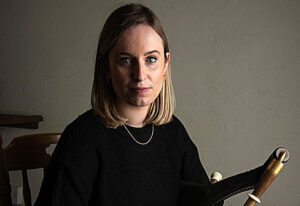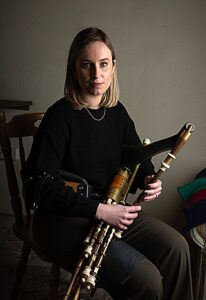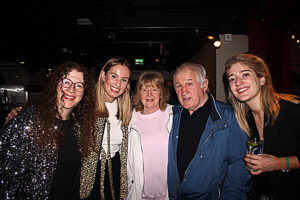
London- Irish uilleann piper Rita Farrell told David Hennessy about going from South London Irish Centre and Return to London Town to playing on the Graham Norton Show with Robbie Williams.
Rita Farrell, 33, is well known on the London trad scene.
A founding member of the Parish Céilí Band, she is familiar face at Return to London Town.
Rita was one of the London- based musicians chosen to feature in TG4’s traditional musical series Ceolaireacht when presenter and well known musician Doireann Ní Ghlacáin came to London to shine the spotlight on the London trad scene last year.
She has even played with Robbie Williams and performed on the Graham Norton Show with the Angels singer.
With family roots firmly in County Leitrim, Rita learned the flute before progressing to uilleann pipes under the direction of Marian Gill, Damien Mullane and Emmett Gill.
After studying at Queens University Belfast, Rita returned to settle in London where she works as an architect and remains a prominent figure in the traditional Irish music and session scenes.
Over the years, Rita has played at many traditional music festivals worldwide and has featured at many concerts at Scoil Samhraidh Willie Clancy.
She is also a current board member of Na Píobairí Uilleann.
This Saturday night she will be joining with Colette O’Leary, Tad Sargent and James Patrick Gavin for their new quartet named Béal Bán when they play one of their first shows at the Irish Cultural Centre in Hammersmith.

Is this new group something that you will continue?
“I think so.
“We actually got together for the Islington Proms towards the end of last year.
“Colette was asked to put a band together.
“She’s a phenomenal musician and she’s been in some incredible bands (Bumblebees, the Long Notes) so I was like, ‘This sounds like a great opportunity’.
“I always thought it would be for one night only but once we did that, we got asked by the ICC.
“I think it might (continue).
“We really enjoy playing as a quartet and I think the mix of sounds and instruments and styles works really well.
“I’ve never really been in a band like this.
“When we played in Islington, it didn’t feel like I was performing to an audience.
“It just felt like I was having some tunes with my friend.
“I think that’s how bands should be, especially in Irish music.
“You don’t want things to be too slick.
“I’m looking forward to it, should be a good night.”
Rita grew up in the Irish community in Raynes Park, near Wimbledon. She was immersed in Irish culture from an early age.
“It’s weird because I never really considered myself English because I grew up in an Irish community in South London.
“Life just revolved around Irish dancing, Irish music, going to the Irish centre, going to other Irish centres, and then during the summer, like most people who grew up in London, you just spend all your summers back home so I think we got the best of both worlds.
“Myself and my brother, that was our upbringing.
“We would have been quite big in the South London Irish Association.
“All of our pivotal moments were celebrated in the Wimbledon Irish Centre: My 18th birthday party and communions and confirmations and all sorts.
“It’s still going strong today.
“It’s a really good pillar of the community.
“Weirdly, when I was a teenager, I didn’t really tell my friends much about what I was up to, because I was slightly embarrassed.
“And I speak to a lot of people now and they were kind of the same.
“It was like a kind of secret society for us at the time.
“But now all my friends want to come see us play and it’s really popular.
“There seems to be more of an interest in Irish music and especially the Irish language at the moment as well.
“So there’s definitely a resurgence going on and I’m definitely noticing it especially the amount of gigs people are trying to book me and my friends for and it’s fantastic to see, especially in London.”

I’m sure the London Irish Centre in Camden also came to your attention with the festival Return to London Town starting there..
“We were always going up.
“Actually myself and my brother learned from Marian Gill. She is based in Harrow so she used to come down to Tooting to teach us.
“Then when we got a bit older, she moved the class up to Cricklewood so we spent a lot of time in North London then.
“I think that’s when our sort of friendship group became quite wide, the Irish scene just became the whole of London. And then going to fleadhs and things, I was in ceili bands with the McAuliffes and the Nevins and stuff. They were all based up in north London.
“I spent a lot of time playing in the Camden Irish Centre.
“It was mainly to do with the Return to Camden Town Festival at the time.”
Was that a festival you seldom missed?
“Yeah, it was always great because it always fell on the school holidays from what I can remember.
“It was great that this festival was on our doorstep whereas some of the festivals always clashed with the school holidays.
“We couldn’t, for instance, go to Willie Clancy because that was in July and then same with the Joe Mooney Drumhambo Festival, so it was always really nice to know that there was a festival that we could all go to.
“Karen’s done such a good job with it and it’s nice being in Cricklewood now because there’s a lot of history there.”
Last year’s Return to London closed with a screening of Ceolaireacht which, of course, featured you. It was great to see the spotlight shone on the London scene like that, wasn’t it?
“Yeah, it’s so unique because we’re like a hotbed of musicians from all over the place so you get all these different styles coming in, all these different tunes, and then variations of tunes so there’s so much to it.
“There’s just such a volume of information and I find it quite overwhelming sometimes when you’re talking to one person who’s got a tune and then they’re like, ‘Oh, but then such and such plays this version’. It’s quite hard to keep up but that’s why I love it.
“I think it’s very easy to slot in to the London scene because a lot of people come here for work.
“It’s a very good community and lots of people find that they can improve their work avenues and careers by networking in the traditional Irish music community.
“That’s what I found quite recently.”
What is it that makes the London scene so special? Does it have its own sound and style?
“I don’t think it has a style.
“Reg Hall was saying, ‘It’s like a state of mind’.
“You can get music in London every day of the week.
“There’s loads of sessions on.
“I think it’s your attitude.
“I’d like to welcome new people in to the session.
“I’m always looking for musicians to book the sessions and gigs, so the more the merrier in my opinion and it doesn’t really matter where you’re from as long as you can keep up, which I struggle with sometimes.
“So I don’t think there’s necessarily a style.
“I find that it’s really nice to have the mix, especially the different county styles.
“If I learn a tune from Kerry or someone who’s from Kerry and they learnt it in Kerry, I’d try and replicate that style if I can.
“You kind of pay homage.
“It’s all about emigration so you should respect where everything and everyone comes from.
“I truly believe that you should try and stay true to where a tune is from.
“If you want to give it your own personal style or own touch, that’s totally fine.
“I think London allows you to do that.”
Do you feel the London scene and London musicians have always had that reverence. If you went to Leitrim, there was no snobbery..
“There definitely wasn’t any snobbery, I never experienced any.
“Then I lived in Belfast as well for a good few years so I never experienced anything, any hostility.
“That might have been because of my background and the fact that I opened my case and there’s a full set of Uilleann pipes, and everyone’s like, ‘Okay, maybe she knows a tune or two’.
“You go to Leitrim and you’ll probably play with people who are from Leitrim or from the surrounding counties but there’s nowhere really in Ireland apart from maybe Dublin or Galway or the big cities Belfast where you would have people from literally all over Ireland playing in one session.
“That’s what I find quite incredible about living here, but I do love going back and playing in Ireland.
“When I get off the plane in Ireland, you let a deep breath out.
“The music fits the landscape.
“It goes hand in hand with the landscape.
“Over Christmas I went up to the John McKenna cottage which is in the mountains behind my mum’s home place.
“It’s this beautiful little cottage that the John McKenna Society have, over the years refurbished.
“I was doing a little photo shoot and it was mainly just because I don’t have any professional photos of me playing an instrument.
“It was just so lovely being able to play in such a historic building and amongst all of this beautiful scenery and looking out over Lough Allen, it was just stunning.
“It was quite nice to be surrounded by all this familiar landscape and I could just play away on the pipes.
“It was such a perfect day.
“The weather was great, the music was great and the craic was great.
“The London lifestyle here I’m constantly moving, I’m on the road playing three or four times a week sometimes.
“It’s really nice to stop and it’s great to be like, ‘Right, I’m just gonna immerse myself in Ireland and not think about work and just concentrate on what makes me happy’.
“And that’s normally playing music in Ireland.”
Obviously you’ve got to do other incredible stuff as well like Robbie Williams and the Graham Norton Show.
How did that come about?
“Oh, it was so weird.
“It was just before COVID, so 2019. That Christmas.
“Well, it was actually started in the summer.
“A musician called Will Pound basically text me saying, ‘Do you fancy working on Robbie Williams’ album?’”
Rita initially thought it must be a musician in the trad world that shared a name with the former Take That singer much like there is also a trad musician who goes by the name of Colin Farrell.
“And initially I was like, ‘Who’s Robbie Williams? What instrument does he play?’
“Thinking like Colin Farrell.
“I initially thought, ‘Oh, do I know this Robbie? Where’s he from? Maybe he’s from Belfast or something’.
“Then it wasn’t a random musician.
“It was Robbie Williams.
“It turns out that Will Pound knows Guy Chambers (songwriter of many Robbie hits).
“Robbie and Guy wanted an Irish influence on this track called Fairytales and so myself and Emma Sweeney, who’s a great fiddle player from Manchester, were on it.
“We recorded this in May 2019 so it was quite bizarre listening to Christmas songs during the early summer period.
“That was really funny.
“Then the CD came out and then we got contacted by Graham Norton’s team.
“He had requested that particular song to be on his show.
“So we got to go on.
“It was an amazing experience.
“It was like an out of body experience for me.
“We got to meet all of Robbie’s band at that stage and they’d played with him during the early 2000s and Robbie Williams was there obviously, and Graham Norton so we met everyone.
“It was just a really cool day.
“It was mind boggling.
“I just never thought that playing the Uilleann pipes would lead me to be playing with Robbie Williams, who I loved as a kid as well.
“I absolutely loved his music.
“It’s just mad.
“Any kids that play now I’m like, ‘Keep playing. You never know where it will bring you’.
“To be given that opportunity and to work with Guy Chambers as well, that was incredible.
“We got to see his music studio.
“I was playing into a mic that The Beatles had played into.
“It was quite like, ‘What?’
“It’s been quite mad.”
Did you get to hang out with Robbie much, what was he like?
“He was really nice.
“When we were backstage, he was making sure myself and Emma were comfortable.
“He was like, ‘Help yourself to food’, things like that.
“But he was getting makeup done at the time so we had a little bit of conversation but that was about it.
“But he was a really, really, really nice guy.
“I was worried that when you meet your heroes and they’re not as good as you think they are, but I genuinely thought he was a lovely person and looked after us very well.
“Same with Graham Norton. He was pottering about backstage and making sure that we had teas and coffees and all sorts.
“It was really good.”

You say you didn’t realise where playing the uilleann pipes would take you. What is it about the instrument that called to you?
“I first got really attached to them listening to Liam O’ Flynn who was in Planxty.
“I just felt that they just had such an amazing voice to them.
“You can play them on their own and they accompany themselves.
“I just became quite obsessed.
“I told my teacher, Marian Gil. She said, ‘Oh, my son Emmett plays’.
“So he kind of taught me sporadically over a few years every time I was back in Ireland.
“I started on the flute and I still play the flute.
“I really enjoy playing the flute.
“I think the pipes, there’s something so unique and I’m always learning.
“I’m always learning about the instrument so it kind of keeps you on your toes.
“They’re quite temperamental.
“Sometimes you’re bashing your head against the wall and the weather affects them.
“They’re kind of a labour of love.
“I’m on the board of the of Na Píobairí Uilleann and we run a uilleann piping day every year and it’s basically a chance to have a go at the pipes for people who’ve never played before.
“We just give people the opportunity to understand what they feel like because they’re such a full bodied instrument and a lot of people are like, ‘Oh, this is really difficult’.
“You do get this appreciation for when you hear a good piper, to be able to control such a human instrument.
“I mean, it’s all wrapped around you and you’re using three of your limbs plus your hands so there’s a lot going on.”
What are you most proud of?
“I’m truly quite flattered that Doireann would ask me and some of my lovely friends to be on such an amazing programme.
“I think when I moved back from Belfast to London I was kind of a bit nervous about getting back into the London scene.
“Myself and Eimear McGeown started up a session at The Bear and ever since then, I’ve noticed a real resurgence of young women coming into Irish music more and feeling safer in session atmospheres.
“I think I’m mostly proud of that, the community that we’ve managed to establish here.
“When I was asked to be on the board of Na Píobairí Uilleann, that was a massive moment for me and I take that role incredibly seriously because the preservation of the Uilleann pipes is really important.
“I was on a CD Mná na bPíob Uilleann Volume 1 which is an all female uilleann piping CD.
“Again really flattered to have been asked to be on that.
“Then I helped kind of get everyone together and produce it with Emmett Gill and John Blake.
“That was really good.”
Béal Bán play the Irish Cultural Centre this Saturday 18 January.
For tickets and information, click here.



